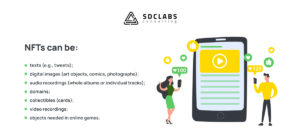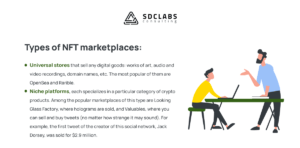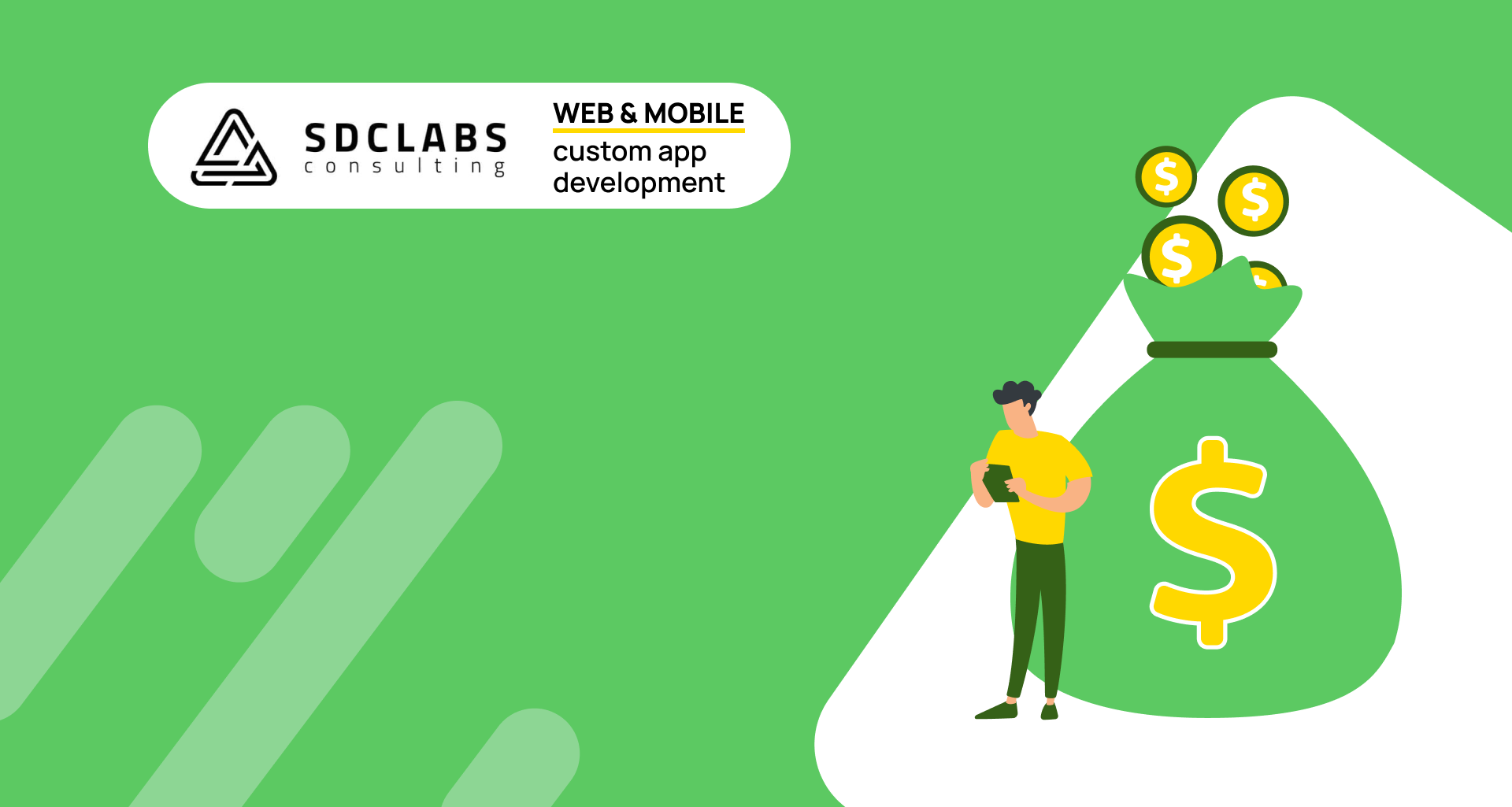The global Covid19 pandemic has changed everything in life. Quarantine and the significant restriction of citizens’ freedom of movement forced many organizations to change their location – to move into the digital space. For example, galleries and museums have mastered VR technologies, and auction houses have begun to apply combined bids, selling luxury goods and works of art online.
But in addition to traditional e-commerce and online tours, a relatively new player has appeared on the market – NFT technologies. It has allowed art collectors and sellers to make a fundamental transformation, creating digital marketplaces that sell, again, digital goods.
To understand just how popular digital object trading has become, just look at the following statistics: in the second quarter of 2020, sales in this area amounted to $1.3 billion, while in the third quarter of the same year, this amount increased 8 times to $10. 7 billion.
In this article, we will talk about how to create an NFT marketplace, why it is called the trend of 2022, and how to take advantage of it.
Non-fungible Token: Concept and Features
A non-interchangeable (unique) token, or NFT, is a type of cryptographic token that has unique characteristics and, due to its originality, cannot be replaced or exchanged for another token.
NFTs can be:
- texts (e.g., tweets);
- digital images (art objects, comics, photographs);
- audio recordings (whole albums or individual tracks);
- domains;
- collectibles (cards);
- video recordings;
- objects needed in online games.

The basis for the operation of unique tokens is the Ethereum blockchain technology, which makes it possible to transfer NFTs between different programs.
Absolutely all unique tokens have the following properties:
- Intangibility – a token is a cryptographic object that can be compared with virtual securities.
- Integrity – cannot be divided into small parts.
- Authenticity – thanks to the blockchain, it is easy to check who owns the token. If, after purchasing, the same images are found on the Internet, you can be sure that these are just copies. If a token is counterfeited or an NFT is created based on an item the author does not have rights to, its owner can go to court.
- Subject to sale – the owner of the NFT can sell it on special NFT marketplaces or regular sites like eBay. Also, digital objects can be resold.
- Liquidity – the uniqueness of non-fungible tokens and the fact that they can be sold at any time greatly increases their liquidity and attracts a large number of buyers to them, from beginners to experienced collectors and traders.
- Cross-system – thanks to the ERC-721 and ERC 1155 standards, based on which tokens are developed, they can interact with several ecosystems.
- Programmability – since all NFTs are digital objects, they are programmable and feature unlimited design possibilities.
- Scarcity – some NFTs are deliberately issued in small quantities to create scarcity artificially. It is especially true for digital works of art.
Today, many celebrities, including athletes, musicians, and artists, are creating their own NFTs, and an entire company can be the initiator of issuing a unique token.
So, the digital version of Banksy’s “Love is in the Air” in 2021 was bought by Sotheby’s auction house for $12 million. Now they plan to divide it into 10,000 parts, each of which will be a separate NFT. Each token is going to be sold for approximately $1,500.
NFT Marketplace Domain
NFT is a kind of familiar marketplace like Amazon, eBay, or Walmart, with one difference, it stores and sells not physical goods but digital ones in the format of non-fungible tokens. On such sites, both fixed prices and auctions can be arranged. To trade on them, users need to acquire a cryptocurrency wallet.
Types of NFT marketplaces:
- Universal stores that sell any digital goods: works of art, audio and video recordings, domain names, etc. The most popular of them are OpenSea and Rarible.
- Niche platforms, each specializes in a particular category of crypto products. Among the popular marketplaces of this type are Looking Glass Factory, where holograms are sold, and Valuables, where you can sell and buy tweets (no matter how strange it may sound). For example, the first tweet of the creator of this social network, Jack Dorsey, was sold for $2.9 million.
The principle of operation of NFT sites
The work of NFT marketplaces is based on smart contracts – algorithms used in blockchain technology, confirming the ownership of something. It enters into the blockchain all the information on the conditions under which the agreement was concluded. In other words, this is a digital analogue of a paper contract that is signed when a purchase or sale is physically executed.
The main feature of smart contracts is their self-execution; if all conditions are met, the transaction is carried out automatically.
Other features and benefits of smart contracts:
- are governed by the blockchain;
- transactions are carried out in cryptocurrency;
- the transaction takes several minutes;
- do not require legal support;
- are cheaper than the physical conclusion of transactions;
- all data about the agreement (information about the supply, authenticity, and token owner) are securely protected.
To use the NFT marketplace, a trader must go through several stages:
- Register on the platform.
- Create a cryptocurrency wallet.
- Upload your unique tokens.
- List digital goods for sale by choosing one of the options – a fixed price or a bid to sell at an auction.
- The added NFTs are thoroughly tested.
- After approval, tokens become available to buyers.
- The seller starts receiving offers to buy.
- If an item is sold in an auction, the seller will be notified of the highest bids once the auction ends.
- There is a transfer of crypto and digital funds for it.
The “if/then” algorithm is triggered at the last stage: if payment for a unique token is received, then seller sends it to the new owner. The next step is an automatic transaction.
How to Build an NFT Platform
If you’ve decided to start trading non-exchangeable tokens, it’s time to talk about how to build an NFT marketplace. To begin with, as in the case of the development of any software, it is worth considering all the organizational issues:
- analyze the future audience;
- describe the objectives to be achieved through product development;
- determine the functionality of the marketplace;
- choose the best development approach.
If the first and second points are purely individual and depend on what you plan to sell, then the functions for almost any NFT will be the same:
- Virtual storefront. As in any other online store, potential buyers should see an advertising catalog with a description of the product when visiting the site.
- Convenient search form. A store that takes a long time to find the right product repels visitors. Group all similar tokens into categories to simplify the process.
- Applying filters. The ability to sort goods will help buyers better navigate the site. Make available sorting by price level, popularity, and NFT novelty.
- Creation of a collection. Adding tokens and descriptions to them should be as simple as possible.
- Check status. This feature is required because all NFTs are tested before being added – it will be helpful for the seller to know at what stage it is.
- Auction Organization. Since auctioning is one of the types of trading on NFT platforms, it is essential to give users the ability to control their bids.
- Ranking. You can make available the creation of product ratings for buyers who doubt the choice and the rating of verified, reliable sellers.
- Crypto wallet. Cryptocurrency is the only format of funds that can be used to pay for digital goods. Therefore, a wallet for it must be on the NFT marketplace. You can only select the wallet type.
For example, the Rarible platform offers its users several options:
- MetaMask;
- torus;
- Mobile Wallet
- Blocto;
- temple;
- beacon.
In addition to the above functions, you can improve your NFT marketplace by adding more functionality. For example, a user forum will bring your traders and buyers into a true community.
It remains to understand the technical details of creating an NFT platform. Who to ask for help? Or is it possible to do it yourself?
Turnkey Solutions
If you decide to create and develop an NFT marketplace yourself, you should be aware of the benefits of your solution:
- Using a turnkey solution ensures a quick project implementation, which automatically means faster time to market and profit.
- This method is less expensive; you do not have to pay for the services of developers.
But this method also has its drawback. The available functions of your future marketplace are limited by the platform’s capabilities taken as a basis. For example, choosing the OpenSea platform with its SDK tool will give you a platform with OpenSea functionality, but you will be able to apply unique design solutions.
Custom development
If the previous option does not suit you, and you want to get a completely unique product, the only way out is to order the development of a marketplace.
The advantages of this method:
- It is possible to create an infrastructure that fully meets the customer’s requirements.
- Easy scaling of the project in case of business expansion.
- Ensuring the privacy of sellers and buyers.
Naturally, this approach will cost more. We will talk about it further.
How Much Does it Cost to Create your own NFT Marketplace
Due to the amount of work, developing a trading platform from scratch will cost more than installing a finished product. The complexity and scale of the features you want to add to the site will also affect the cost.
Thus, you will have to invest in such works:
- design (UI / UX development);
- architecture;
- integration of payment functions;
- core functionality (authorization and security, user profiles, home page, search, filters, product page, ratings, shopping cart, payments, notifications, Ethereum integration, NFT management, buyer and admin panels, etc.);
- services beyond development (project management, product quality control).
To clarify the cost of all types of work, contact our manager – SDC specialists will conduct a detailed consultation on all issues of interest to you and bring your most daring ideas to life!





